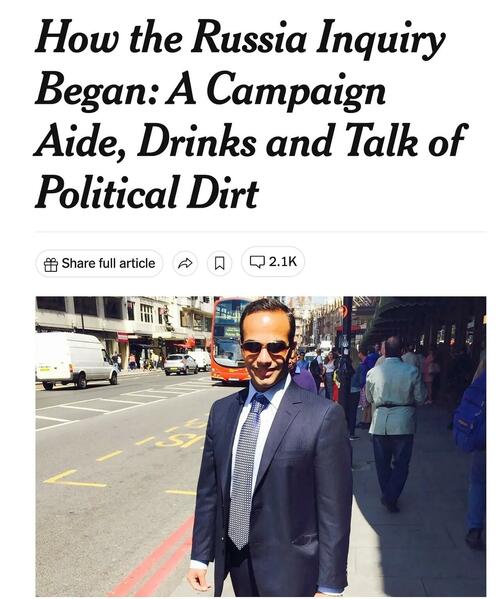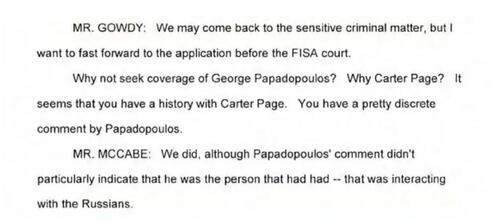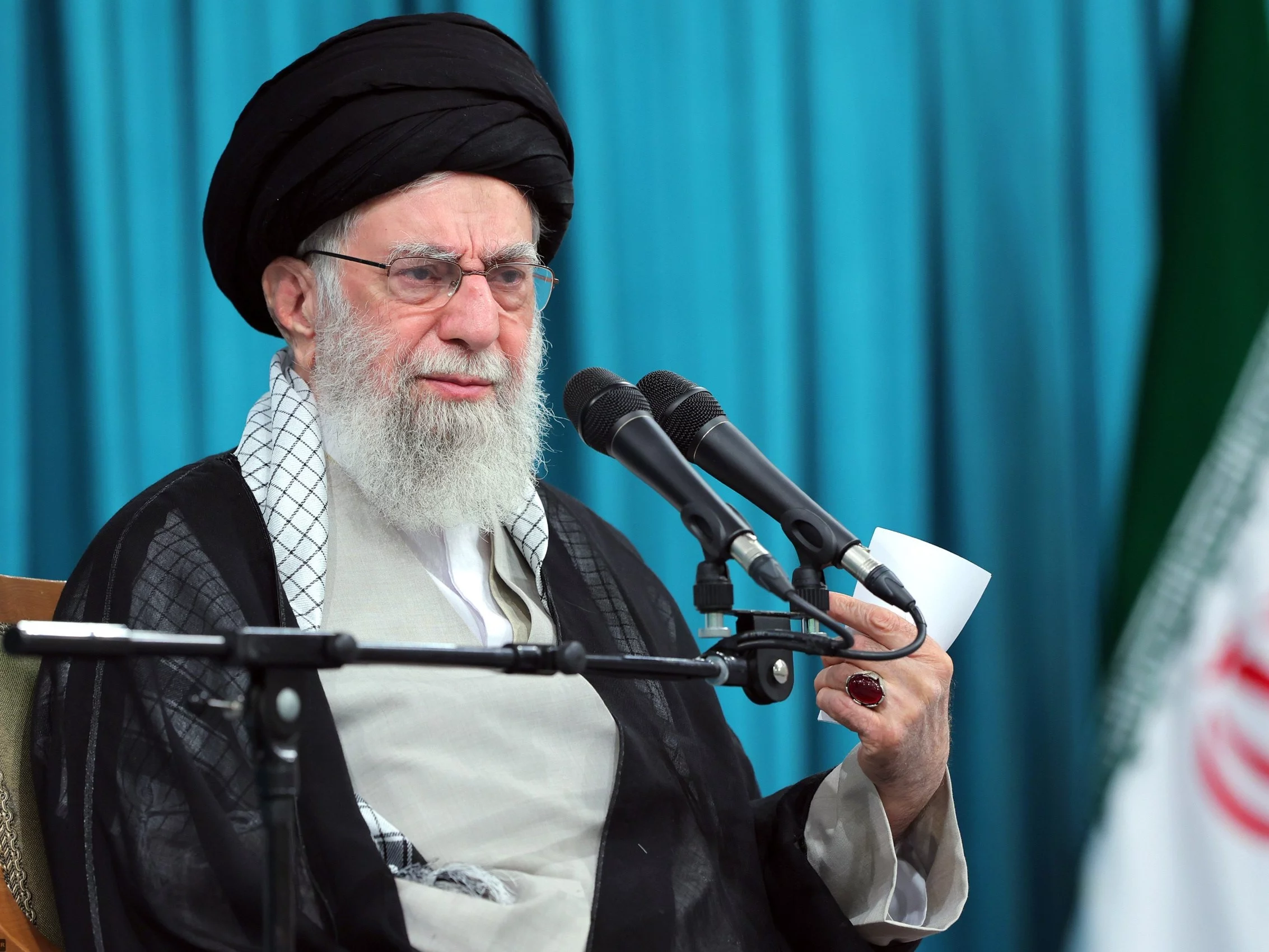
Тайбби: «Нью-Йорк Таймс не может перестать сосать»
Автор: Мэтт Тайбби, Racket News
Как и ожидалось, Нью-Йорк Таймс Опубликовал секретное приложение к докладу Дарема. Чарли Сэвидж писал:
Каш Патель, директор ФБР и другие союзники Трампа заявили, что недавно рассекреченный доклад о расследовании в отношении России предоставляет «доказательства того, что кампания Клинтон планировала подставить президента Трампа и сфабриковать мистификацию о сговоре с Россией». Реальность почти полностью противоположна... Отчет показывает, что предполагаемое электронное письмо, которое сторонники Трампа давно пытались изобразить как дымящийся пистолет, скорее всего, является подделкой. Российские шпионы, похоже, пытались сделать его аутентичным, собирая отрывки, снятые с места преступления. реальные электронные письма Различные жертвы взлома...
Г-н Трамп и его помощники связали эти релизы с дикими и неточными заявлениями о том, что они показывают, превратив отчеты в доказательство его давнего повествования о том, что расследование было обманом, спровоцированным врагами по политическим причинам.
Вся эта линия «собрана российскими шпионами» основана на одной оценке о паре электронных писем, вероятно, полученных русскими от других. реальный Американские жертвы хакеров. Помимо этого примера «композита», в статье игнорируется гигантская нагрузка материала из того же источника, который был описан в нескольких других отчетах как реальный и затрагивающий многочисленных американских «жертв» из исполнительных и законодательных органов, а также аналитических центров и НПО.

Более раздражает диатриба Сэвиджа против Патель и мистификация «повествование», предлагаемая без упоминания примерно десяти миллионов случаев, в которых Сэвидж Время Он провалил освещение Патель и республиканских расследований в Russiagate. Когда в начале 2018 года Патель и тогдашний председатель Комитета по разведке Палаты представителей Девин Нуньес опубликовали столь осуждённую «памятку монахинь» о злоупотреблениях FISA, Сэвидж лично «аннотировал» документ, который почти два года спустя будет полностью предан суду в результате расследования Генерального инспектора. Об обвинениях в злоупотреблении FISA, которые включали использование досье Стила для получения полномочий по наблюдению, Чарли написал:
У ФБР были «серьезные опасения по поводу материальных упущений факта, которые фундаментально влияют на точность меморандума», добавив: «Обвиняя ФБР в пропуске важной информации, критики этого меморандума говорят, что в самом меморандуме отсутствует важный контекст: другие доказательства, которые не были получены от мистера Стила, большая часть которых остается засекреченной». "
Это часто используемый первоначальный аргумент, что материал Стила не был важен для ордера FISA.Сэвидж неоднократно высказывался по этому поводу, а также в другом месте: «Информация г-на Стила была лишь одной нитью в гобелене доказательств из различных источников, которые меморандум игнорировал, преувеличивая его относительную важность." Генеральный инспектор Горовиц разбил это, заключив, что Стил «играл центральную и существенную роль.";
Сэвидж продолжил в «аннотации»: Он не обращает внимания на тот факт, что Пейдж привлек интерес ФБР в 2013 году, когда агенты поверили, что российские шпионы пытались завербовать его. Почему Патель не включил эту деталь? Поскольку Пейдж был информатором, который в то время был на хорошем счету в ЦРУ, факт, что адвокат ФБР был осужден за то, что опустил его. Сэвидж, который позже написал об осуждении Кевина Клайнсмита, опустил те же критические детали, что и Клайнсмит — возможно, неосознанно, но все же;
Сэвидж писал: «Язык, используемый здесь в отношении г-на Стила с ФБР, предполагает, что это было формально. Но он никогда не вступал в формальные отношения от которого он может быть отстранен или прекращен, по словам знакомых людей...». Стил был уволен из ФБР 17 ноября 2016 года, за несколько лет до статьи с аннотацией, показывающей, что «знакомые люди» Сэвиджа либо не были «знакомы», либо дергали его цепочку. Коллега Скотт Шейн охарактеризовал увольнение как решение ФБР «положить конец увольнению». формальный Отношения» со Стилом. Упс.
За что это стоит, за Время Без помощи Сэвиджа также проглотил всю мистификацию о Гамильтоне 68 и описал хэштег #ReleaseTheMemo как работу российских «ботов»; запустил редакционную статью под названием «Записка Нуньеса — это все дым, а не огонь»; и запустил полную редакционную статью (которая, кстати, снова процитировала фальшивую панель инструментов Гамильтона 68), описывая отчет Нуньеса как «фальшивый скандал», разработанный, как расследование по электронной почте Клинтона, чтобы отвлечь внимание от «реального заговора», расследованного Робертом Мюллером. Это удивительно похоже на сегодняшнюю историю, в которой релиз Durham описывается как попытка «изменить тему с нарушенного обещания выпустить файлы Джеффри Эпштейна». Они пишут одни и те же истории снова и снова. Это никогда не заканчивается.
Однако то, что действительно взбесило сегодня, это раздел:
В действительности ФБР начало расследование на основе информации, полученной от австралийского правительства в конце июля 2016 года, после того, как WikiLeaks опубликовал электронные письма демократов, украденные российскими хакерами, и нарушил демократическую конвенцию. Советник кампании Трампа предположил, что до того, как хакерство стало публичным, кампания получила поддержку со стороны России и знала, что она будет делать.
Этот пункт вызывает возмущение. Он тщательно написан, чтобы скрыть, насколько Время «Как началось расследование по России: помощник кампании, напитки и разговоры о политической грязи»" Это, как утверждается, история происхождения Russiagate, объясняя, что 26 июля 2016 года, через четыре дня после того, как Wikileaks просочились тысячи документов, наносящих ущерб Демократической партии, австралийские власти рассказали американским коллегам о подозрительном разговоре на тему России помощника Трампа Джорджа Пападопулоса с дипломатом по имени Александр Даунер.

Печально известная история о «напитках и грязи»
The Время Пападопулосу говорили о «грязи» России в виде «тысяч писем, которые смутили бы миссис Клинтон», переданных ему мальтийским профессором Йозефом Мифсудом. Это было описано как «драйв-фактор» для ФБР, открывающего свое расследование «Харрикейна перекрестного огня» в отношении Трампа и России 31 июля 2016 года.
Почти все в этой истории было неправильно. Это заняло некоторое время, но сам Даунер в конце концов признал, что не было никаких «грязных» разговоров или разговоров по электронной почте. Из публичного доклада Дарема:
По словам Даунера, Пападопулос В письмах Клинтон не упоминается, грязьили любой конкретный подход российского правительства к команде кампании Трампа с предложением или предложением о предоставлении помощи.. Скорее, Даунер вспоминал, что Пападопулос просто заявил, что «у русских есть информация», и все.
Даунер также сказал, что он «не понял, что Пападопулос был посредником в координации с русскими». Еще больше раздражает? ФБР бросило Пападопулоса в качестве ведущей недели в расследовании урагана Кроссфайр, а заместитель директора Александр Маккейб свидетельствовал, что его комментарии «не особенно указывают» на контакт с россиянами:

Искажение «грязи» и «тысячи писем» — это плохо, но показания Маккейба показывают, что ФБР знало в августе 2016 года, что Пападопулос был тупиком. Но «нынешние и бывшие американские чиновники» отшлифовали эту гадость и скормили ее Время Полные полтора года спустя. Затем газета использовала его для своего блокбастера о том, как Пападопулос сыграл «критическую роль» в драме «Рашагейт».
Это будет печально известный облава и клевета. Пападопулос был совершенно не связан с какой-либо разведывательной схемой и просто использовался в качестве технического притворства, чтобы начать то, что оказалось фиктивным расследованием. Тем не менее, Время Оштукатурил его лицо по всей его первой странице в качестве плаката ребенка скандала, что в ретроспективе было гордой рекламой того, как плохо они были согнуты своими источниками.
Теперь, годы спустя, Сэвидж не только переписывает этот отрывок без имени «Пападопулос» и без ссылок на «грязь» или «тысячи писем», но и использует ловкость рук, чтобы предложить, что это такое. был Между молодым помощником Трампа и австралийским дипломатом есть смысл. Он описывает «советника кампании Трампа, предполагавшего, что до того, как [российский] взлом стал достоянием общественности, кампания получила поддержку со стороны России и знала, что она будет делать. " Знал, что он будет делать? Сэвидж упускает из виду тот факт, что Пападопулос на самом деле не получал никакой информации от России и не имел и не утверждал, что знал о хакерских атаках. Он не играл никакой значимой роли. Это часть того, Время легендаТем не менее, он сделал это, поэтому Чарли скрутил прозу, как чистильщик труб, чтобы соответствовать нескольким оставшимся полезным фактоидам.
Ирония заключается в том, что, хотя Пападопулос не был настоящим началом «Рашагейта», история, которую Дарем рассказал о том, что США приобрели большую часть разведданных из России гораздо раньше в 2016 году, вероятно, была. Это были настоящие разведданные о России, которые смущали Клинтон, а не Трампа. Даже в этот поздний день, после стольких историй о «Рашагейте», которые газета облажала, они продолжают рвать эту чушь. Отдай свой Пулитцер, клоуны!
Тайлер Дерден
Солнце, 08/03/2025 - 19:50








![W "Piątce" wiedzą, iż bezpieczeństwo to podstawa! [ZDJĘCIA]](https://www.eostroleka.pl/luba/dane/pliki/zdjecia/2025/557735075_1431347902326116_6686935248664708856_n.jpg)







